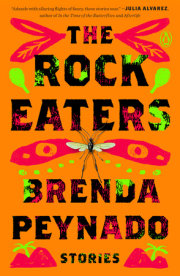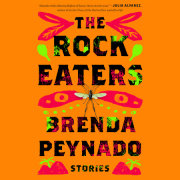Thoughts and Prayers
The morning before the school shooting passed like any other, all my neighbors out at dawn performing oblations to the angels on our roofs. Families clustered around the sidewalks, mist from our lawns swirling around our ankles, looking up at the angels' pale humanoid faces and downy bird bodies perched beside our chimneys. Our mothers beat their breasts, performing sorrow for the tragedies that always went on elsewhere in the world. Our parents yelled their usual "Thoughts and prayers! Thoughts and prayers!" toward the angels atop our roofs. As children, we were supposed to kneel in the moist grass and be quiet, in case the angels were ever to speak.
The angels, for the most part, barely noticed. They chewed their cud from the grasses and bugs they scavenged during the night and then shat runny white on our roofs, the shingles looking iced with snow despite the Florida heat. When I was in kindergarten, we'd thrown rocks at them to get their attention, but they'd just turned and resumed their silent watch over the neighborhood.
My parents began the ritual, already dressed in their work clothes, looking as polished as a photograph in front of our freshly painted stucco house. I was obedient in my stiff school clothes-my mother never allowed me to stumble outside in my pajamas like some of the other kids.
There was no greater argument in our house than when my mother thought I had done something unworthy of our angel.
Out of all the angels, ours was considered the most blessed of the neighborhood. When my parents came to this country after college, this house was the first one they looked at, and their immigration papers arrived miraculously within the week. While others searched for homes and jobs for months, my parents sailed into their new life, prayed gratefully to their new rooftop patron. When the economic downturn came and brought with it a plague of layoffs, my mother was able to keep her tech job, and my father flourished in a financial field that boomed in downturns ("Betting on failure," he called it). The hurricane tore apart most roofs in our Florida suburb, but not mine. Every day my mother returned to the house, pulling into our drive, she breathed a great sigh as she saw our angel perched beside our chimney: albino faced, sleek winged, dumb eyes that looked at nothing. At our basketball games the parents cheered for us, but it was known that the real game was played silently among the angels.
Across the street, my best friend Rima Patil's family kneeled in front of their ramshackle house, the embarrassment of the neighborhood: mold blooming on the stucco, brown waves along the roofline where the gutters and wooden fascia had fallen into disrepair, a bright blue tarp over the roof above Rima's room, where a hurricane had downed a tree, just barely missing their angel. The blue tarp rolled and snapped like a flag of shame.
Rima's family was known to have the worst angel on the block. Her dad was one of the first to get laid off, lose health insurance. Her older brother had developed schizophrenia and claimed that the angels gave him secret messages; the family didn't have the money for his medications. The bank had visited their house three times in the past month. When the hurricane hit, the oak tree in front of their yard not only punched a hole in the roof, but also fell onto the family car. The tarp they placed over it leaked mist and bugs and occasional angel guano. That they were the one Hindu family in a neighborhood of Latino Catholics was not lost on my mother, though the fact that they were even darker than the rest of us, my mother pretended not to notice. Rima was wild, a force of nature, and my mother was known to count this as one of Rima's mother's misfortunes. Nothing terrible had happened to Rima's sister, Shruti, yet-she was valedictorian, a national-prize cellist, who radiated beauty-but we were all waiting; there was a sense that she would not be spared. It was Shruti Rima got her strength from, though while Rima's came out in recklessness and force, all elbows and knees, her sister had merged it with a softness that came out in glory when she played music. I idolized Shruti for her ability to walk the line between strength and obedience, her ability to get away with doing what she wanted while still looking like a saint-unlike Rima, who fooled no one, and me, feeling caged and wanting desperately to do something unforgivable.
Rima winked at me and then resumed solemnity, leaning on her fists in their overgrown grass. Her long black braid flicked with the impatience of a cat's tail as she turned back, echoing how it often weaponized into a whip on the basketball court. Her sister, Shruti, inclined her head as if she were still at her cello, her own long black hair draping over one shoulder. I knew Shruti had woven Rima's braid, had raked her deft fingers through the silken mess, had crooned a Carnatic composition as she worked. For the moment, Rima's lanky brother, Rajiv, was quiet, his eyes sallow from sleeplessness, instead of having his usual energy. Their mother beat her chest with one hand and kept her other hand dug into Rajiv's elbow in case he started with one of his outbursts. Their father, still in his pajamas, gritted his teeth and barked, "Thoughts and prayers," like it was being dragged out of him. Back in Bengaluru, they'd had other words, other rituals, for the angels on their roofs.
The angels above us looked on into the distance, snapping their mouths to eat mosquitoes from the air.
How could I have known that this would be the last time I would see all of them together, that unlucky family? If I had known, what would I have done to protect them?
Sunrise bled hot over the roofs like a punctured yolk, another day given to us. Neighbors quieted and rose from kneeling on their lawns. Kids sprung up, suddenly released from piousness to get ready for school. I lunged for my backpack by the front door and dashed across the street.
Rima grinned in greeting, leaning against the crumbling stucco of their front stoop with a swagger. Behind a bush that had overgrown the half wall of their stoop, I showed Rima a tube of lipstick that I'd snatched from my mom, a cocoa pink. It wasn't Rima's style-she always went brazenly bare, glittering only with the sheen of sweat, though her parents forbade her nothing. But this small rebellion assuaged the hot throb in my chest.
"Yeah," she said. "Do it."
I painted my mouth jaggedly with the tube, my trembling excitement and the sharp line of my fear of my parents' no-makeup rule getting the best of me.
Shruti emerged from the house, backpack slung cleverly over one shoulder, her hair draped over the other. Shruti could wither anyone with a look, and her arm around your shoulder made you hum with joy. She clicked her tongue at me in pity, cupped my chin with cool fingers calloused by cello strings, dragged her fingernail along the edges of my lips to fix the colored mess.
Rajiv flung open the door, and he gave me a thumbs-up. His smile transformed his tiredness, and I noticed his bravery despite the voices that tormented him sometimes, despite what the angels told him. It was never good. The angels always said it wouldn't end well for him, but that for the rest of us there was still a chance. And yet he faced each new day with a bright smile. "Give 'em hell," he said now.
Surrounded by the bold three of them, I could pretend I was the fourth, fear of getting caught breaking the rules melting from me like candle wax.
"Stay good, kiddos," Shruti said, running a swipe of her hairbrush through her hair.
Rima rolled her eyes, any entreaties to behave sending her instead slingshotting off into trouble. "I'll race you, Paola."
Rima and I ran together to the bus stop, cutting through lawns, kicking up morning moths into a fraying cloud of white. She pulled ahead, her braid licking the air in front of me, and I followed after her, trying to close the gap. Shruti, Rajiv, and the other kids of the neighborhood streamed behind us, the daily pilgrimage. We had every reason to believe the day was bright ahead of us and we would survive it.
At school during recess, a boy on the basketball court got in front of us in a game of horse. "Wait your turn," I yelled, but that was as far as I let myself go. The boy turned around and said triumphantly as his wrist cocked and the ball swished into the net, "Go back to your country." Rage boiled in me. Rima grabbed his collar and flung him toward the back of the line. He tripped, spilled on the ground with his palms burned raw. Then Rima and the boy whirled in a fast-moving cluster as they fought on the court, him pulling her hair and her fingers around his ears, wrestling him to the floor. Police lights flailed once in the parking lot of the middle school. Two policewomen whispered to the teacher supervising recess, who turned pale and called for Rima. The boy, upset because he had always expected to have the right to call us whatever names he wanted, shook the hair out of his eyes and, stood up straight like he was innocent, and pointed at her. I thought the police were arresting Rima-for just being her fierce, untamable self. She'd been unlucky again, with her defective angel. I was afraid for her, and I knew horrible things could happen to people under police protection. I promised Rima that I would never leave her alone, that I would commit a crime just so they'd put me in jail with her, and I could be her witness if anything happened.
She laughed. "I'll be back before you know it." She squeezed my hand and let me go. She fixed her braid and walked toward the officers with a bounce. While I bucked the expectations that came with having a good angel, Rima owned that she had a bad one, wore her family's misfortunes with a grin that looked as dangerous as a lion's mouth. She made life bearable for me beyond my perfect handwriting, my straight As-life with her full of streaking across sidewalks and lawns like fireballs, secret desires whispered and let loose, the challenge in her eyes to reach for just a bit more than we were given. I knew that the only thing I ever did right was attaching myself to her, inviting her over even when my mother turned her nose up at their cursed family. When they led her away that afternoon, one of the officers putting a heavy hand on her shoulder, she didn't look back. I noticed, perplexed, that a few other kids were led away from their classrooms to the back of the patrol car.
After the end-of-school bell, my mother surprised me by being in the car line instead of having me get on the bus. I'd forgotten to wipe off the last of the lipstick from earlier, and my mother took a rough paper towel to my mouth. My lips stinging, rosaries swinging from the rearview mirror, my mother explained as she drove what had really happened:
Shruti had been in the high school music room. I imagined her curtain of hair swinging over her cello as she played. The arts magnate high school bused in musicians, painters, theater kids from across town, and Shruti was the only one from our neighborhood. It was study hall period for her, so there was no one else in the music room, and her continuous, transcendent playing must have covered the pops of gunfire, the gunman going classroom by classroom. After the boy-a white kid, someone Shruti had had no interest in going out with but who had never accepted "no" for an answer-left the music room, she was found slumped over her cello as if she'd given up on song. Fifteen other kids dead, twenty-eight injured. The boy, when he reached the end of the one long corridor, locked himself in the bathroom, looked in the mirror, and shot himself, sparing the hidden schoolmate who trembled over a toilet.
"So he's gone," my mother concluded. "And you're safe."
As we pulled into our driveway, my mother threw her eyes up to the roof where our angel was perched, as if not to anger its goodwill as she spoke. Across the street in Rima's house, their curtains were closed. Their minivan was gone. Their angel squatted between the chimney and the hurricane tarp, wings folded shut.
Rima's family didn't come home for hours, and I kept one eye on their empty driveway while I watched the news, looking for the Patils. I still couldnÕt believe it. Three shootings had happened across the country that day, but I only watched the coverage for Shruti's high school: cops swarming around the building, yellow police tape, reporters jamming microphones in the faces of kids who'd survived, shaken and sobbing. Someone's best friend, someone's boyfriend, someone's daughter. Someone saying the boy had given off all kinds of red flags. Someone else saying apologetically that he seemed like a really nice guy. I wanted to understand why that boy did it, incredulous that the balance Shruti had always walked between being good and being brave had betrayed her.
The news patched in an interview with a gun rights activist and then one with a member of the Mothers for the Sanctity of the World, who were still touring at the location of a two-days'-previous school shooting. The Mother focused on blessedness, on calling on the protection of the angels, and she punctuated her impassioned speech with a swing and rattle of small relics tied up her arm. She was full of prayers for the souls of the lost, but full, too, of threats for potential shooters. The Mothers, all of them white ladies, toured the country with their families, handing out guns, training, and T-shirts from their sponsors, staging armed marches protesting anyone who would stand against them, shooters and gun control pacifists alike. They were mothers of school shooting survivors, those lucky few children in the right classroom, who huddled behind the right desk, who asked for the bathroom pass at just the right time. In the background of the interview shot, their giant red tour bus grumbled its engine. They were heading to one of the new school shootings that had happened today, along with the Good Guys with Guns and the Innocents, what they called their husbands and children, their great pilgrimage through the year taking them from slaughter to slaughter.
Copyright © 2021 by Brenda Peynado. All rights reserved. No part of this excerpt may be reproduced or reprinted without permission in writing from the publisher.






